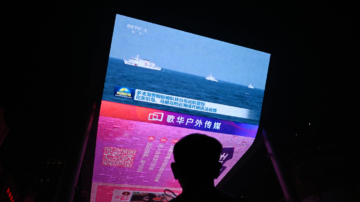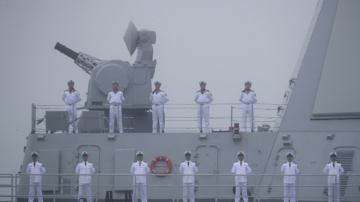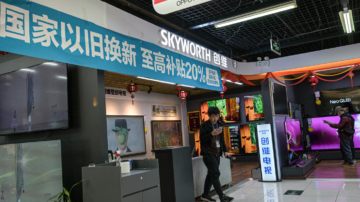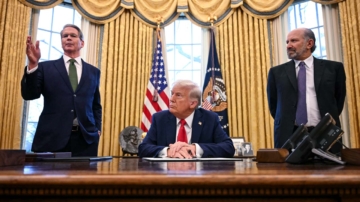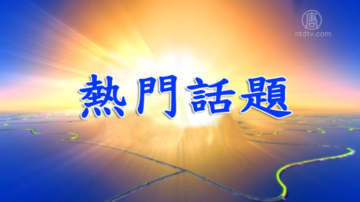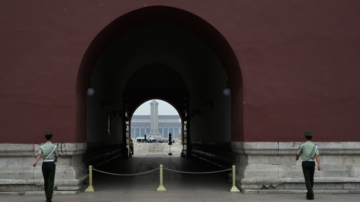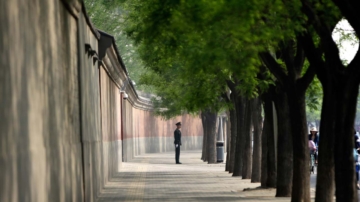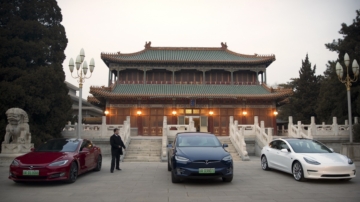【新唐人2013年05月03日讯】总部设在华盛顿的非政府组织“自由之家”,在5月1号发布了《2013年全球新闻自由度报告》,批评中国政治改革遭遇挫折,加强了网管和监控。不过,学者指出,习近平早已选定了“毛式路线”。请看报导。
“自由之家”的报告说,中国新当选的领导人中,大多数都依靠走强硬路线建立政治生涯,这对期望实施有意义的政治改革是个打击。
为显示新领导人不太可能接受政治自由化的潮流,中共当局在过去两个月里,加强了互联网的审查和监控。
这份报告评出:最缺乏政治权利和公民自由的国家和地区,其中有白俄罗斯、查德、中国、古巴、老挝和南奥塞梯;全球两个最不自由地区,一是中共统治下的西藏,另一是摩洛哥控制的西沙哈拉。
美国国务院日前发布的《2012年各国人权报告》指出,在中国独裁政府下,镇压已成为常态,特别是维权人士的自由更大受打压,而在去年11月的18大之前,新疆和西藏人权受压的情况更见严重。而美国国际宗教自由委员会4月30号发布的年度报告也说,中国的宗教自由在过去一年“显着恶化”。
深圳杂文家朱建国指出,习近平的基本思路是走“毛式路线”,他的8条新规定就是毛泽东的那一套:用领袖的监督代替民主,代替法制,他在5月1号接见大庆、和大寨的代表,进一步说明了他要走毛的路。
深圳杂文作家朱建国:“他上来了目标很明确,实际上就是把胡锦涛暗暗终止的政治体制改革,正式明确的把它终止了。他根本不会搞甚么政治体制改革,他的内部讲话讲前苏联的历史教训就已经说了,他绝不会走戈巴契夫那条路的,也不会走蒋经国的路。”
朱建国认为,习近平吸取了30年来中共改革派从来没有得到好下场的教训,沿着胡、温的发展经济加维稳的路走下去。
《德国之声》指出,习、李新政上台,新闻打压依旧。香港媒体人、国际记者协会亚洲负责人胡丽云表示:“原来中共当局过去所做的所有事情都是一场戏,他们从来也没有改变,或去尊重新闻自由。”
北京宪政学者陈永苗:“习近平他已经找到法西斯主义的方向了,他也不会改革、他也不会不改革,他就按着原来毛泽东、邓小平给他留下来的路径,然后走向超越左右的,然后在改革已死的前提下,他就是不断的维稳,然后不断加大对底层民众的资源掠夺的方向。”
北京宪政学者陈永苗认为,习近平只能是当一天和尚撞一天钟,走一个左右平衡的法西斯主义之路。
另外,朱建国还指出,由于习近平受教育的局限性,他的眼光、视野非常短浅,他只看到毛泽东的成功之处。虽然他和他父亲在文革中受了很多苦,但是他并没有真正认识到那条路给国家、给百姓带来的深重灾难。
朱建国:“历史真正的大潮流他没有看清楚,这世界100年来翻天覆地的变化,近二十年来世界民主的新走向,他都没有看到。他的眼睛只盯着钱,只盯着经济上,他以为有了经济,就证明这条路就走通了,但是他忘了当年的清朝的GDP是全世界第一,但是它依然会垮台。”
时事评论员蓝述:目前中国社会的两种力量,底层民众要求解决中共问题的这股力量和中共利益集团,它们之间的矛盾没有任何的妥协可言。所以说中间道路走不通。现在的问题是,第五代的领导人他怎么样决定他自己的未来的问题。”
时事评论员蓝述认为,第五代领导人是与利益集团一起彻底垮台﹖还是与底层民众合作﹖选择摆在了他们面前。
采访/陈汉 编辑/宋风 后制/萧宇
Xin Jinping Takes “ Maoist Line”
On May 1, Washington-based NGO Freedom House
released its annual report, Freedom in the World 2013.
The report says that the Chinese Communist Party’s
new leaders bring little hope for meaningful political reform.
And that the CCP authorities have reinforced
internet censorship and surveillance.
Scholars indicate that Xi Jinping has in fact taken the
Maoist route in politics. Let’s see our news report.
The Freedom House report stated that
members of the new CCP leadership team “have generally
built their careers on hard-line policies”.
This is “a serious blow” that has hit on the hopes
for meaningful political reform.
The report indicates that “As if to emphasize
the point that the new leaders are unlikely to
usher in an era of political liberalization,
the government has taken steps in the last two months
to reinforce internet censorship and surveillance.”
The report listed the countries that have the fewest
political rights and civil liberties, which include:
Belarus, Chad, China, Cuba, Laos, and South Ossetia.
The two worst-rated territories in the survey are
Tibet, under the CCP’s rule and
the Western Sahara, which is controlled by Morocco.
The U.S. State Department recently released it’s
2012 Human Rights Report.
shows that suppression remains commonplace
under China's authoritarian regime.
The report states that rights activists have suffered
many more crackdowns in 2013.
And that before the 18th CCP Congress
which was held in November 2012,
many more serious human rights violations
occurred in Xinjiang and Tibet.
On April 30, the U.S. International Religious Freedom
Commission released an annual report.
It says in the past year, religious freedom in China
has seen “significant deterioration”.
In the view of Zhu Jianguo, Shenzhen writer,
Xi Jinping has actually taken “the Maoist line”.
Xi’s eight rules are a replica of Mao’s thought,
which replaces democracy and rule by law
with the leader’s own supervision.
On May 1st in a meeting with representatives
from Daqing and Dazhai,
Xi stated explicitly that he would take Mao’s route.
Zhu Jianguo: “The new leader’s goal is very clear.
That is, to openly terminate moves toward
political reform that Hu Jintao had covertly suspended.
He won’t launch any political reform.
In an internal meeting, he explicitly said that
he wouldn’t follow either Gorbachev or Chiang Ching-kuo.”
Zhu Jianguo says that Xi Jinping has drawn a lesson
from the events of the past 30 years,
the CCP’s reformists have all come to a bad end.
Zhu analyses that Xi will continue on the path
explored by Hu Jintao and Wen Jiabao.
That is, economic development, escorted by
stability preservation.
Deutsche Welle comments that, under the
CCP’s new leaders, media control remains unchanged.
Woo Lai Wan, the chairperson of Hong Kong
Journalists Association, said that
“All the CCP authorities did in the past
was to stage a show.
They’ve never changed, nor have they respected
the freedom of the press.”
(Beijing constitutional scholar) Chen Yongmiao:
“Xi has found direction in fascism.
He won’t initiate reform, nor will he refuse to reform.
He will just move along the old path that was left
by Mao Zedong and Deng Xiaoping.
Then he will transcend the leftist and the rightist wings.
As reform is ended, he will continue to maintain
stability, and expand the plundering of the grassroots.”
Chen Yongmiao speculates that Xi will take
a careful and balanced path of fascism.
Zhu Jianguo adds that Xi Jinping, limited by his
education, has a shallow vision——
he is only focusing on Mao’s successes.
He and his father suffered a lot
during the Cultural Revolution.
However, he has never truly understood
how over and again in the past,
severe calamities have been brought to
the nation and the people by taking that path.
Zhu Jianguo: “He hasn’t yet discerned the historical trend.
He hasn’t seen either the dramatic changes that
have occurred in the past century nor has he seen
the new world’s trend towards democracy.
He has only focused on the economy, thinking that
economic growth is sufficient proof of success.
But he has forgotten that in the Qing Dynasty,
China’s GDP topped the world, yet the regime still collapsed.”
(Lan Shu): “Currently, there are two forces in China:
the grassroots force against the CCP, and the CCP interests group.
The conflict between the two sides has no solution.
So it’s pointless for the CCP to choose the middle way.
Now the question for the fifth generation of CCP leaders
is how they will choose a future for themselves.”
What choice will the fifth generation of CCP leaders make?
To collapse along with the CCP interests group,
or to cooperate with the grassroots?
Lan Shu indicates that they will each
have to make their own choices.
“自由之家”的报告说,中国新当选的领导人中,大多数都依靠走强硬路线建立政治生涯,这对期望实施有意义的政治改革是个打击。
为显示新领导人不太可能接受政治自由化的潮流,中共当局在过去两个月里,加强了互联网的审查和监控。
这份报告评出:最缺乏政治权利和公民自由的国家和地区,其中有白俄罗斯、查德、中国、古巴、老挝和南奥塞梯;全球两个最不自由地区,一是中共统治下的西藏,另一是摩洛哥控制的西沙哈拉。
美国国务院日前发布的《2012年各国人权报告》指出,在中国独裁政府下,镇压已成为常态,特别是维权人士的自由更大受打压,而在去年11月的18大之前,新疆和西藏人权受压的情况更见严重。而美国国际宗教自由委员会4月30号发布的年度报告也说,中国的宗教自由在过去一年“显着恶化”。
深圳杂文家朱建国指出,习近平的基本思路是走“毛式路线”,他的8条新规定就是毛泽东的那一套:用领袖的监督代替民主,代替法制,他在5月1号接见大庆、和大寨的代表,进一步说明了他要走毛的路。
深圳杂文作家朱建国:“他上来了目标很明确,实际上就是把胡锦涛暗暗终止的政治体制改革,正式明确的把它终止了。他根本不会搞甚么政治体制改革,他的内部讲话讲前苏联的历史教训就已经说了,他绝不会走戈巴契夫那条路的,也不会走蒋经国的路。”
朱建国认为,习近平吸取了30年来中共改革派从来没有得到好下场的教训,沿着胡、温的发展经济加维稳的路走下去。
《德国之声》指出,习、李新政上台,新闻打压依旧。香港媒体人、国际记者协会亚洲负责人胡丽云表示:“原来中共当局过去所做的所有事情都是一场戏,他们从来也没有改变,或去尊重新闻自由。”
北京宪政学者陈永苗:“习近平他已经找到法西斯主义的方向了,他也不会改革、他也不会不改革,他就按着原来毛泽东、邓小平给他留下来的路径,然后走向超越左右的,然后在改革已死的前提下,他就是不断的维稳,然后不断加大对底层民众的资源掠夺的方向。”
北京宪政学者陈永苗认为,习近平只能是当一天和尚撞一天钟,走一个左右平衡的法西斯主义之路。
另外,朱建国还指出,由于习近平受教育的局限性,他的眼光、视野非常短浅,他只看到毛泽东的成功之处。虽然他和他父亲在文革中受了很多苦,但是他并没有真正认识到那条路给国家、给百姓带来的深重灾难。
朱建国:“历史真正的大潮流他没有看清楚,这世界100年来翻天覆地的变化,近二十年来世界民主的新走向,他都没有看到。他的眼睛只盯着钱,只盯着经济上,他以为有了经济,就证明这条路就走通了,但是他忘了当年的清朝的GDP是全世界第一,但是它依然会垮台。”
时事评论员蓝述:目前中国社会的两种力量,底层民众要求解决中共问题的这股力量和中共利益集团,它们之间的矛盾没有任何的妥协可言。所以说中间道路走不通。现在的问题是,第五代的领导人他怎么样决定他自己的未来的问题。”
时事评论员蓝述认为,第五代领导人是与利益集团一起彻底垮台﹖还是与底层民众合作﹖选择摆在了他们面前。
采访/陈汉 编辑/宋风 后制/萧宇
Xin Jinping Takes “ Maoist Line”
On May 1, Washington-based NGO Freedom House
released its annual report, Freedom in the World 2013.
The report says that the Chinese Communist Party’s
new leaders bring little hope for meaningful political reform.
And that the CCP authorities have reinforced
internet censorship and surveillance.
Scholars indicate that Xi Jinping has in fact taken the
Maoist route in politics. Let’s see our news report.
The Freedom House report stated that
members of the new CCP leadership team “have generally
built their careers on hard-line policies”.
This is “a serious blow” that has hit on the hopes
for meaningful political reform.
The report indicates that “As if to emphasize
the point that the new leaders are unlikely to
usher in an era of political liberalization,
the government has taken steps in the last two months
to reinforce internet censorship and surveillance.”
The report listed the countries that have the fewest
political rights and civil liberties, which include:
Belarus, Chad, China, Cuba, Laos, and South Ossetia.
The two worst-rated territories in the survey are
Tibet, under the CCP’s rule and
the Western Sahara, which is controlled by Morocco.
The U.S. State Department recently released it’s
2012 Human Rights Report.
shows that suppression remains commonplace
under China's authoritarian regime.
The report states that rights activists have suffered
many more crackdowns in 2013.
And that before the 18th CCP Congress
which was held in November 2012,
many more serious human rights violations
occurred in Xinjiang and Tibet.
On April 30, the U.S. International Religious Freedom
Commission released an annual report.
It says in the past year, religious freedom in China
has seen “significant deterioration”.
In the view of Zhu Jianguo, Shenzhen writer,
Xi Jinping has actually taken “the Maoist line”.
Xi’s eight rules are a replica of Mao’s thought,
which replaces democracy and rule by law
with the leader’s own supervision.
On May 1st in a meeting with representatives
from Daqing and Dazhai,
Xi stated explicitly that he would take Mao’s route.
Zhu Jianguo: “The new leader’s goal is very clear.
That is, to openly terminate moves toward
political reform that Hu Jintao had covertly suspended.
He won’t launch any political reform.
In an internal meeting, he explicitly said that
he wouldn’t follow either Gorbachev or Chiang Ching-kuo.”
Zhu Jianguo says that Xi Jinping has drawn a lesson
from the events of the past 30 years,
the CCP’s reformists have all come to a bad end.
Zhu analyses that Xi will continue on the path
explored by Hu Jintao and Wen Jiabao.
That is, economic development, escorted by
stability preservation.
Deutsche Welle comments that, under the
CCP’s new leaders, media control remains unchanged.
Woo Lai Wan, the chairperson of Hong Kong
Journalists Association, said that
“All the CCP authorities did in the past
was to stage a show.
They’ve never changed, nor have they respected
the freedom of the press.”
(Beijing constitutional scholar) Chen Yongmiao:
“Xi has found direction in fascism.
He won’t initiate reform, nor will he refuse to reform.
He will just move along the old path that was left
by Mao Zedong and Deng Xiaoping.
Then he will transcend the leftist and the rightist wings.
As reform is ended, he will continue to maintain
stability, and expand the plundering of the grassroots.”
Chen Yongmiao speculates that Xi will take
a careful and balanced path of fascism.
Zhu Jianguo adds that Xi Jinping, limited by his
education, has a shallow vision——
he is only focusing on Mao’s successes.
He and his father suffered a lot
during the Cultural Revolution.
However, he has never truly understood
how over and again in the past,
severe calamities have been brought to
the nation and the people by taking that path.
Zhu Jianguo: “He hasn’t yet discerned the historical trend.
He hasn’t seen either the dramatic changes that
have occurred in the past century nor has he seen
the new world’s trend towards democracy.
He has only focused on the economy, thinking that
economic growth is sufficient proof of success.
But he has forgotten that in the Qing Dynasty,
China’s GDP topped the world, yet the regime still collapsed.”
(Lan Shu): “Currently, there are two forces in China:
the grassroots force against the CCP, and the CCP interests group.
The conflict between the two sides has no solution.
So it’s pointless for the CCP to choose the middle way.
Now the question for the fifth generation of CCP leaders
is how they will choose a future for themselves.”
What choice will the fifth generation of CCP leaders make?
To collapse along with the CCP interests group,
or to cooperate with the grassroots?
Lan Shu indicates that they will each
have to make their own choices.

